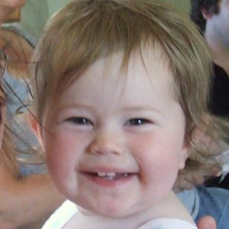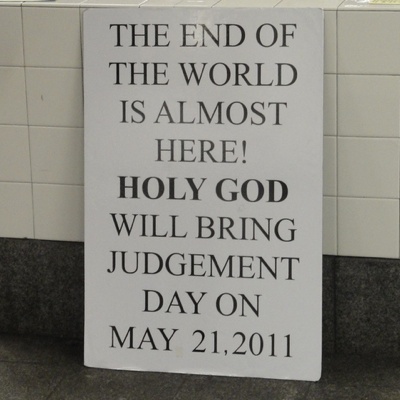
While I do a very imperfect job of it, I am a Dad and I love each of my children very, very much. My biggest fear is that something bad might happen to them – if anything bad is to happen to my family I would prefer it to be me who suffers rather than my wife or children. When I pray for my kids at night I ask Jesus to hold them close and keep them safe, knowing full well that in fact bad things do happen to Christians and their kids just as bad things happen to other people (see Luke 13:1-5).
In praying for God to keep my kids safe, my primary thought is that He will give them the faith to trust Him and keep that faith intact no matter what happens. I try not to think about the things that could happen to them, partly because it is a pointless, anxiety-producing exercise and also because God tells us not to worry ourselves about ‘what-ifs’ (Matthew 6:34). A more grey area is anxiety regarding how I might respond to a tragedy or suffering in my family – in part such anxiety is about something that may never happen, but it also relates to how deeply rooted my faith in Jesus and God’s goodness is – will my faith survive being tested?
Having been a Christian for over twenty years, my faith has been tested in various ways over that time but not by anything really major. I very much feel like the father asking Jesus to heal his child:
And Jesus said to him, “‘If you can’! All things are possible for one who believes.” Immediately the father of the child cried out and said, “I believe; help my unbelief!” (Mark 9:23-24 ESV)
I believe, Jesus help my unbelief. In fact, I have felt this deeply in praying for my daughter to be healed of severe ezcema – I know Jesus has the power to heal her, yet also know that mostly healing comes through medicines and doctors and often people just have to endure sickness in this fallen world. Am I praying with faith when thinking like this?
When I worry about the safety of my children, a child who comes to mind readily is little Aisling Symes who died tragically a year ago, leaving a devastated family grieving her loss while clinging to faith in Christ. I’m sure they have struggled much over the past year, but their faith and the support of their church last October was inspiring to me and still helps me to be mindful of where my trust needs to be.
A couple of extracts of what was said by Pastor Russell Watts of Ranui Baptist Church in Auckland at the funeral of Aisling Symes on October 16, 2009:
“Last week we searched day and night, we posted flyers, we prayed for Aisling, for the family, for the police, for the nation to find her.
On Monday night we were still praying here in the church and many other churches joined us in prayer for her safe return. While God speaks to prophets about tragedies or impending disasters, to most of us He gives words of encouragement or comfort or words that will build character. And so, motivated by hope and love, we really felt that she was safe and that God was going to return her to Alan and Angela. When you love you hope, when you want to put practical legs on hope you pray, and often a miracle will result.By this time Aisling had been in heaven for a long time, by our standards. And yet, I believe that God took those prayers which we prayed too late, and He stored them up and poured out His help in different ways. The Bible says that He treasures the tears of every believer. We did not get the answer to prayer that we really wanted; it was already too late, a tragic accident had taken place. But I know God still responded with compassion to our tearful pleas.”
“When you love, you hope, when you want to put practical legs on hope you pray,” this may seem odd to an action-oriented, make-it-happen-yourself type of society, but actually goes straight to the core of where the power to make things happen lies – with God, not us. Only God knows what the real purpose was in taking Aisling home so soon was, but her disappearance moved this nation to pray and helped many of us to see more clearly what is truly valuable:
“In a hundred years’ time that great house we built will be crumbling and decaying, that career we worked so hard at will not matter to anyone anymore, that sporting trophy or medal or money in the bank that we accumulated just won’t hold any significance to anyone anymore.
Paul, in writing to the church at Corinth, said all that stuff would pass. Those things aren’t eternal but these three qualities will remain: faith, hope and love, and the greatest of these is love.
I would suggest to you that in those intense seven days of prayer, of searching and supporting, that you did something better, and bigger, than win a gold medal or gain world recognition. You displayed three qualities that really matter, three qualities that really count, three values that are of eternal significance – faith, hope and love.”
(Quoted with permission from an article featured in the November 2009 issue of the NZ Baptist newspaper.)
I have read 1 Corinthians 13:12 many times and have read commentaries about this verse, but this is by far the best and most vivid summary of the meaning and application all integrated in one that I’ve ever encountered. Love, hope and faith all in action as tearful, even fearful people pray desperately for God to have mercy on a little girl.
What I am talking about here is not some abstract, theoretical ideal of how faith should work – many of us prayed for Aisling to be found, her family and church grieve to this day, and so the reminder that the love, prayer and support given to them, the hope in Christ that she is right now in God’s loving arms, and the faith behind all of these – this is real. When I fear for my children, I am grateful for the reminder that faith, hope and love are what counts for eternity.
Jesus said to the ruler of the synagogue, “Do not fear, only believe.”
(Mark 5:36 ESV)
God bless you Aisling.


 Micah 5:2-4 is quoted in part in Matthew 2:6, which cites the passage as indicating that the Messiah was to be born in Bethlehem, the town of David.
Micah 5:2-4 is quoted in part in Matthew 2:6, which cites the passage as indicating that the Messiah was to be born in Bethlehem, the town of David.